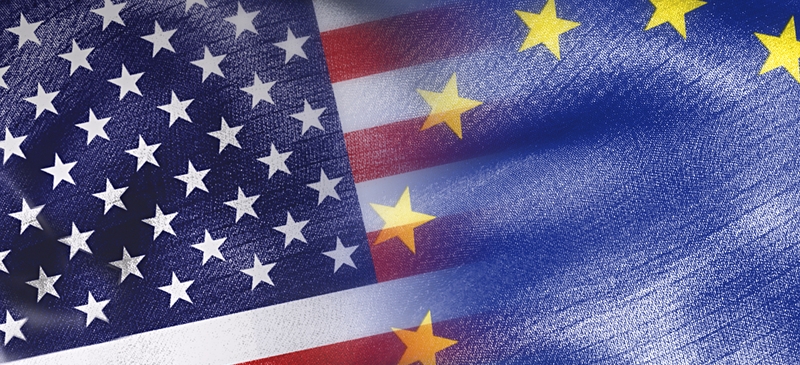
Towards better days in EU-US relations
As the field of candidates in the US presidential election dwindles, the future of US foreign policy is becoming clearer. The changes, as seen from Europe, will be mostly for the better. Both Barack Obama and John McCain want to close the notorious prison camp for suspected terrorists at Guantánamo Bay, pay closer attention to global warming, and listen more to allies. But there are significant differences between them, for example over Iran, Russia and trade.
Obama says he is willing to speak to Iran directly, to convince the government to suspend uranium enrichment. McCain is not prepared to talk – at least not to the current government in Tehran. That matters to Europe. Britain, France and Germany, which lead the EU talks with Iran, are convinced that the US should at least try to speak to the Iranian government. Talks may not persuade the Iranians to stop enriching uranium. But without trying, the US and Europe will not be able to garner support for further UN sanctions from China, Russia and the rest of the world. And without concerted global pressure on Iran, the nuclear talks have little chance of succeeding. So Obama’s view would be more helpful to Europe’s Iranian diplomacy than McCain’s.
Obama and McCain also disagree on trade policy. McCain is an unabashed free-trader. Obama sees free trade as beneficial on balance, but says that those who lose from it need assistance. He says he would seek to renegotiate the North American Free Trade Agreement (NAFTA) and other free trade deals, to add social and environmental protection clauses. And he may be less keen than McCain to fight for an ambitious outcome of the Doha round of world trade talks – which would put him at odds with the EU. True, Obama may set aside protectionist rhetoric when in power (he needs to sound tough on trade to win over blue collar working class voters). On the other hand, the economic downturn may push the next US president – whoever he is – towards protectionist policies.
Interestingly, Obama has focused his criticism of free trade on NAFTA rather than the trade deficit with China. And McCain is openly in favour of trading and engaging with China. There seems little divergence between the candidates, or between them and Europe, on economic relations with China. This should make it easier for the EU and the US to press China jointly to open its markets further, and to revalue the renminbi.
Regarding the Middle East neither candidate wants to speak to Hamas, the radical Islamic group that controls half the Palestinian territories. Officially, Europe does not either, but in private some European leaders are wondering whether they should. The longer Hamas remains an influential force in Palestine, the more Europeans will move towards engaging it. In the long run, this move could lead to transatlantic friction – unless the next president rethinks his stance, which is not inconceivable: the candidates cannot freely speak their minds on such a sensitive subject during an election campaign.
On Russia the candidates differ noticeably. McCain believes that the US can do without a close relationship with Moscow, given the minimal economic ties between the countries. And he wants to be tough on Russia over its undemocratic political system and its aggressive behaviour towards neighbours such as Georgia and Ukraine. His views are echoed in most of the Central and East European member-states and a few others like Sweden. Obama is less keen than McCain on installing missile defence systems (which the Russians hate) in Europe, and would make less fuss about Russia’s internal politics. But like McCain, Obama would want to see Georgia and Ukraine in NATO, so both candidates would be at odds with Germany and France, which oppose NATO enlargement lest it irritate Russia.
On the whole, US-European cooperation on foreign policy seems likely to improve, irrespective of who wins the elections: the next president will end the policies that most irk Europeans, like Guantánamo or opposition to a climate change agreement. In fact, given that Mitt Romney does not think Guantánamo is a problem, and that John Edwards and Hillary Clinton are more protectionist than Obama, Europe has arguably ended up with the best possible choice of candidates.
There is a risk that the next US president will assume that the departure of George W Bush will automatically make the Europeans rally in support of American polices around the world. Such an assumption could lead to bitter disappointment in Washington. Obama’s people seem aware of this risk. They say Obama would proceed cautiously, not making ‘unreasonable’ demands such as for the Europeans to replace the American troops that withdraw from Iraq. That would not fit into Obama’s strategy anyway: he wants to use the spectre of US military withdrawal to unify Baghdad’s warring coalition parties.
However, at some point Obama would ask Europe to do more in Afghanistan, as would McCain. The next administration is likely to send more US troops there and expect Europe to do the same. It would ask European countries to reverse the steady decline of their defence budgets, and it would welcome a bigger role for the EU in European defence, provided this resulted in more military capability. On Afghanistan, the Europeans may disappoint the next president; on defence spending, they are almost certain to do so.
Obama represents the cleanest break with America’s least popular policies. As such, he is well positioned to repair the huge problem of America’s poor image in many parts of the world. And that matters to Europe. The French president, Nicolas Sarkozy, once observed that the US, by virtue of its size and might, is the leader of the free world, and when it becomes unpopular, Europe’s reputation suffers, too. A US which commands more prestige and authority would strengthen Europe’s hand in dealings with Iran or China.
